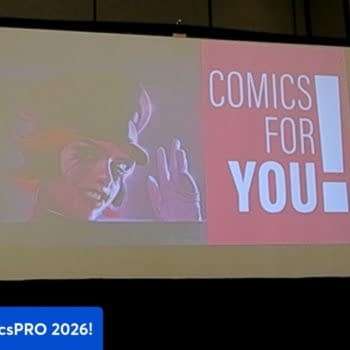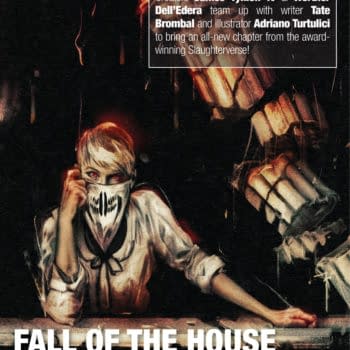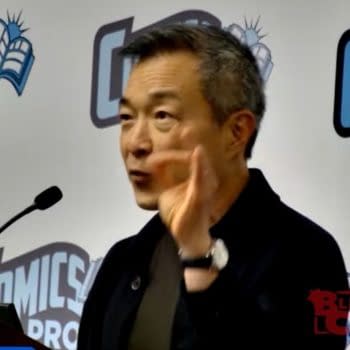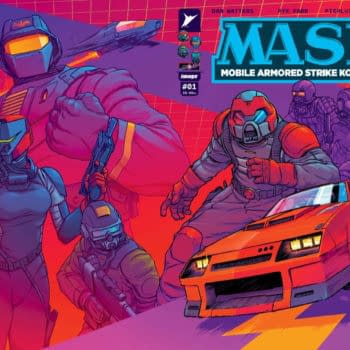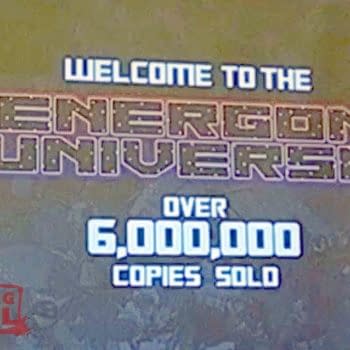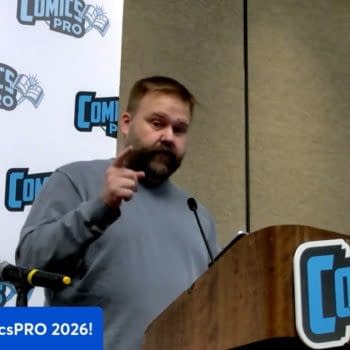Posted in: Comics | Tagged: Comics, entertainment, Ocho, phoenix comic con
Talking With Eric Mengel About The 20 Year History Of Ocho At Phoenix Comic Con
Neil Greenaway reports from Phoenix Comic Con, his double-header following reporting for Bleeding Cool from Denver Comic Con! This time he talks with indie creator Eric Mengel about the 20 year history of his mini-comic Ocho.

Eric Mengel: My name is Eric Mengel. I draw a book called Ocho. It's a mini-comic. I've been writing and drawing it for 20 years. It's my love letter to comics. It's my thank you card to all the creators that did all those amazing things for me, you know, when I was reading books heavily.
BC: What books or artists inspired you to start Ocho?
EM: A lot of different ones. I mean, obviously reading comics for so long at some point you to start to think "I could probably do this on my own. I could probably write something better than this idea." And then from there, trying to find artists. That would fail, it wouldn't work out. So I said "Ok, I gotta learn how to do this on my own." At that time I was reading a lot of McFarlane's Spider-Man and he had just left Amazing and went on to the regular Spider-Man, the adjective-less Spider-Man, and I just was amazed, impressed that this artist guy could also write it. And it wasn't the best stuff and later on I would realize that, but it was his. He did it himself. Then also these were these books by Dark horse Presents, Concrete by Paul Chadwick blew me away. Later on books like Frank Miller's Sin City, Mike Mignola's Hellboy, Dave Simms' Cerebus, those books, you know, as I got a little bit older and started looking at things like black-and-white and I'm learning how to draw and it all kind of melded. And I don't feel like any one of those guys would define my style but at the same time I feel like it's kind of a buffet. I just like pick little things from them – I like all the blacks, or I like this idea or whatever, I like this main character that looks a little bit different. So that is kind of what I have done.

EM: For me, though I didn't quite realize this early on, I feel like Ocho is me. You know I would consider myself to be a pretty good person. I try to do my good deeds. I try to help people out. And I feel like Ocho is kind of like any of us. We have our best side of us and any of us have our worse side of us. But we would like to talk up the best side and we would like to ignore the bad side. And so I feel like Ocho is probably that next level of me, and it's just kinda like making the world a better place, just trying to make a difference. Just trying to do extra things. Ocho is sent from a far off world to make a difference. I came from Illinois to Phoenix to make a difference. I work in group homes as my day job. And because of that, like it just is a pretty good metaphor, it just works for me. And it's also, I do it first for me, like it's more important for me to do it as a release and as a story and as a challenge. That makes more to me, that means more to me than selling mini-comics at a convention. I just like drawing. Some people like Sudoku, I like drawing comics. This is my thing.
BC: You recently ran a successful Kickstarter. Can you tell us a little bit about that? What was your first experience on Kickstarter like?
EM: It was actually my second experience. My first experience didn't go, but this was before Kickstarter was really "Kickstarter". I had heard of it, I thought it was a great idea but it had not taken off. It was very small at that point. But I thought it would be cool to do a TPB. It failed. I made some money, like some people pitched in, but I didn't make what I was supposed to make. And I didn't do it for a long time, and I was going to do it. Like collecting all of my work, like 3 or 4 TPB's at 200 pages each. And then I thought, "That's a really big gamble". Because you haven't tested that market in years, and your first time you're going to say, "Hey I'm going to put out 800 pages of material, you should support me. Trust me with your money". I just felt like it wouldn't be a good idea. And I started also noticing at conventions, people would come up to me and they would say "Have you done any Kickstarter campaigns? I like to find new material on Kickstarter." And that kind of sunk into my head, like I should really pay attention to that. I thought I should really think about maybe even doing a mini-comic and doing a low, low goal (which I set as $50) and it funded in less than 5 minutes. Or it pledged what I had asked for at that level. Then obviously it kept going up, kept going up and I think we made like $930 or something like that. But it's almost 2000% of what I had asked for so it's really good. I don't know what to make of it. I don't know if I'll do the next issue on Kickstarter or not.
Although I do know that by doing that and my friends spreading the word about it, I met new people who not only supported the Kickstarter but also friend requested me on Facebook or liked my Ocho fansite or Twitter or whatever. All these things I don't necessarily do anyway, but they jumped on board. And some of them, you know, I instant message back and forth with, like they have interesting questions or they are like "Hey I really like what you are doing". And I've learned about their comics that they are making. Because a lot of us that make comics are fans of comics. And we not only like to do our own thing but we kind of like to support what other people are doing as well. So overall, I mean, it was an amazing experience. I think I will do it again, but I just don't know how quickly. Because I don't want to be one of those guys that swing from branch to branch, Kickstarter to Kickstarter. You know, here's the next one. We'll take a little bit of a break. So yeah.

EM: Personally, 20 years… I mean 20 years ago there was not a Facebook page. And I sometimes think, "What would happen if I disappeared off Facebook?" If I just said, "I 'm not going to do these posts, I'm not going to talk about any late night drawing or bother anyone with those things." I think it would have an effect on me. It would have an effect on my sales. It would have an effect on my convention appearances. I think that certain conventions invite me to go to their convention, like Phoenix Comic Con invite me here, because they know I am going to talk up Phoenix Comic Con. And if I disavowed that, if I turned that off I think it would have a hard effect on me. So when I go back and I think what it was like to sit in a box and draw a comic. You can't really tell the world. I mean, at that time, yeah there was the World Wide Web, but it's a much different thing than it is now. I think Facebook and social media has been a huge thing.
I think also, comics and the people who are drawing them have changed. I think that there is (I hope, I hope that there is) this idea for individuality. And not just to do the same rote, kind of, this is the basic thing we are going to stick with, sort of "We are not going to try to evolve, we are not going to support new voices and new things." So I feel that as the media has kind of gone on, and as comics have grown, and as those people that used to say "You have got to draw 11×17, you've got to use a Hunt's mapping point 102 and you've got to use this kind of brush and this kind of ink." I think a lot of that has gone away and now it's just "Hey man, create something. Create whatever you want to do and do something outside of the box. And have fun with it." So, I think that those two things are really key. I feel like those things have really helped, not just me. It certainly has helped me, but I feel like it's helped a lot of different people and I feel it's made the medium more interesting even though numbers indicate that we have had a decline, or we have a little bit of a resurgence, (the pendulum goes back and forth). I feel like the stuff that's coming out and continuing to come out, it's great stuff. Where as the stuff that was coming out, yeah there were higher numbers and more books but the quality wasn't there, it was just cashing in, you know, to control market shares. I think that those things have changed a lot.

EM: We officially met at Jesse James Comics. So a comic book store, and I don't know if I was appearing there, maybe we were just hanging out having a doodle night or whatever. I don't know how Damon got in my life. I don't really remember the moment. I am happy that he is in my life. This kid, he is the future, as far as I'm concerned. At one point I called him my nephew, now I refer to him as my brother. He impresses me. I think back to what it was like when I was a young man drawing comics, 22 years old. Damon was putting books out every other month, and he's always like, "Oh, here's the next issue." He's into the media of photoshop and coloring. He's scanning in pages for my trade paperback collections. And it was just a natural progression. I bought a huge scanner and brought it over and said "Here you go, I'll pay you for pages scanned and I'll pay you for colors. Can you help me out?"
He said "You don't have to pay me." But I had to pay him. I don't want to feel bad about it. And from there, his colors, I just think that he has done an amazing job. An AMAZING job. Hopefully, we'll have more from Damon doing that. And I know we will.
BC: Aside from writing Ocho, you also work in a boys' home. Have you been doing that for a while as well?
EM: Yeah. 20 years, both of them are 20 years. So, Ocho was created in 1993. It was kinda like shortly after Image was founded. Erik Larsen had put together this thing saying "Your character could appear alongside of the Dragon!" At the time, I was learning to draw. I had this bald guy that I was drawing on pads of paper, learning how to draw. Because all the artists that I was getting flaked out. And I just kind of made a little uniform, or a little outfit that he wore, and I sent it off. It didn't win. I didn't get in there. But I stuck with that guy, because it just felt right. So I had done that. At the time, I was going to college. I started working with kids in the college. I wanted to come out to Phoenix from Chicago, I did an internship to finish school. That was at the group home. They hired me three weeks into the internship, and the rest is history. So it has been 20 years living in Arizona, 20 years working in a group home for abused and neglected children, and 20 years of Ocho.
BC: Do you feel that your time with the boys has influenced your comics at all?
EM: It has. They have given me ideas. And they give me things that I want to put in the book. Like, maybe not their struggle, but I definitely want to put some of their mentality in there. And it's really a good thing for them to see, too. They know that I work really hard. With my level of quality, I want the best. We had this past year, academically, we had somewhere between 7 and 9 kids on the honor roll. That's out of ten. That's really good. Specifically for kids in group homes, some of whom have never been in school. One of them couldn't even read. So we really work hard with them, but then they also see that if I have some down time, let's say that we're at a dentist appointment, or counseling, or whatever, and they come out.
Well I'm sitting there drawing. And I can kind of talk to them about, this is important to me too. Or they'll see the next book come out, and they'll ask "How do you do that?" And I say, "Well, I usually go into my office about 8:30 at night. And I usually won't come out until 1:00 or 1:30, depending on how much drive I have or how much I need to get done that night." And they can see that, and maybe draw inspiration from it. Not for them to be comic book artists, but for them to work towards whatever they want to do. You are not always going to get to be the football player, or the NBA star. But you can still join a basketball team. You can still have fun. And this is the same thing. I'm not super-star status. But I'm putting out a book. And I'm having fun, and that is what's important. As long as you don't lose focus on that. That can be where the problems start coming in. You see that in comics, people who are drawing at a certain level of skill, but they have not reached what they consider "making it". So they give up. But these things have to be taken in small steps.

EM: Well, I have jumped around in the storyline, because I do 24 hour comics or 12 hour comics or whatever, so I'm writing in two different areas. I am issue 28, but I could write issue 37, or issue 31 (because I'm done with issues 29 & 30 and 35 & 36). It gets a little confusing, but there is a science to it. And I'm trying to figure it out. Can I jump ahead in the story and then fill it in while making things work, and keeping it interesting. There was a sketchbook from Peepshow Comics, an indie book, and there was a jam strip that used different cartoonists. But they would tell the story out of order panel wise. So they would roll a die. You get panel 5, you get panel 3, whatever. And they would build this story, ad have to make it work. That was really my inspiration. Let's see, can I jump ahead? Also, when I do 24 hour comics, I feel like it would be cheating to just do the next issue (you are supposed to come up with an original idea).











